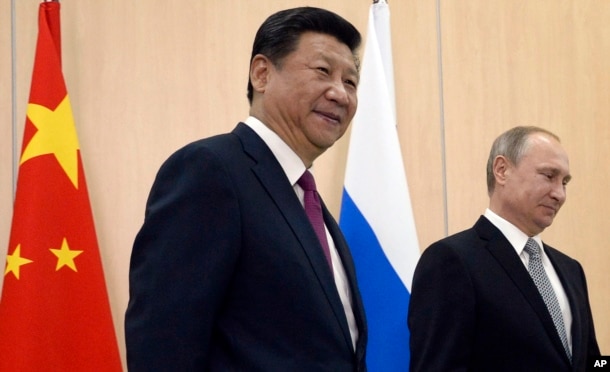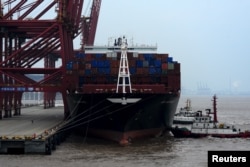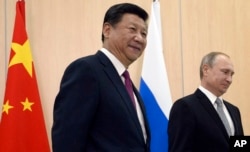M.N.: "The US - Russia - China triangle and the traingulation are the long term reality and phenomenon. The Big Boy at the head of the triangle should deal with it playfully, skillfully and adroitly..." | "The signs... are hard to ignore." - Weaving the Threads of a Possible Trump Doctrine - Geopolitical Diary - JANUARY 20, 2017

Weaving the Threads of a Possible Trump Doctrine - Geopolitical Diary - JANUARY 20, 2017
Quotes:
Indeed, there is a serious argument to be made that even as Russia, still but a pale shadow of its Soviet-era self, threatens various secondary interests, it does not fundamentally threaten the core strategic interest of the United States: to prevent the emergence of a competing hegemon. Therefore, the argument goes, it is ultimately not in America's long-term strategic interest to isolate and alienate Russia, especially when there are bigger fish to fry. Instead, according to this view, Washington should set aside its ideological clash with Russia to focus on other matters.
...
Failure to work with Russia, on the other hand, risks pushing it even further into Beijing's strategic and economic orbit, making effective containment of China more difficult.
...
And whatever Trump's intent, any effort at cooperation with Russia will face intense domestic scrutiny and possibly resistance from large segments of the electorate, not to mention U.S. congressional leaders, the country's foreign policy and national security establishments, and from U.S. allies abroad.
...
To borrow from the philosopher of science Thomas Kuhn, it signals that the "normal" politics of the past three decades could be giving way to something new and revolutionary. At such times, the structures and alliances that grounded the status quo — in this case, the post-Cold War world order — collapse and are replaced by new and sometimes surprising alignments, dynamics and conflicts.
...
the signs... are hard to ignore.
M.N.: The US - Russia - China triangle and the traingulation are the long term reality and phenomenon. The Big Boy at the head of the triangle should deal with it playfully, skillfully and adroitly, as the experienced and unchallenged in his reading and the interpretation of the score conductor, letting the second and the third fiddles follow his baton at all times and letting them to compete for their places in the pecking order of their endless attraction, admiration, and fascination, in order to produce the meaningful and harmonious music, as he sees, feels, and finds it fit.
It is hard to see how all three of them will manage their menage if they decide to jump into a sack together and with each other; it will look ridiculous, and probably will never happen. However, the one of the second row tier might feel and be perceived as the more suitable and the more natural partner for the occasional interactions on a strictly as needed basis. The details of their activities are the secondary matter and subject to the modern give and take, as long as it is enjoyable to both.
The other factors that come into this play are the imitational, copying nature of the junior partners' characters and attitudes: one is the huge and the attractively inexpensive repair shop operating on foreign licenses and the stolen designs and depending on them entirely, for its creative intellectual dick is long past its development time and is limited by its developmental nature, while the other goes through the inevitable process of decline, shrinkage, and a certain degeneration from its slavish Viagra erected heights, due to the unstoppable outflow of blood, brains, and sexy talents.
Kuhn made an interesting observation: the adherents of the old paradigms never change their views, they simply die out, with their false, erroneous, but staunchly held concepts buried with them. Therefore, The Time, with its generational changes and the revolutionary evolution, is the most simple and efficient factor, as it was in the "containment" strategy, and the Big Boy should consider, include, and play with this important factor also, in his construction and design of the new long term paradigm and strategies, while not ignoring the short or near term arrangements, goals, needs, and considerations.
All this might look a bit cynical but appears to be the unavoidably pragmatic.
With regard to the nature of the Sino-Russian relations, there is an old, the Soviet times joke, that illustrates them well. There are two passengers, one the Russian, another the Chinese on the Moscow-Peking express train. The Russian passenger performed all sorts of pranks on his fellow traveler. Finally, when the train approached their destination, he, overwhelmed with guilt and remorse, while his counterpart exhibited the ostensibly saintly, stoic, magnanimous and forgiving behavior in response, ignoring them, the Russian admitted his pranks and asked him for his forgiveness: "Forgive me, brother!" To which the Chinese replied: "Nitzevo, nitzevo, a ya tebe vsyu dorogu v tzai pisil...": "Do not worry about it too much, I pissed into your tea the whole trip..." The story published in the recent VOA article (and probably many other stories to come in the future) about the delivery of the Su-35 planes with their engines welded shut, is in the same category:
"A recent report that Russia had welded shut the engines of Sukhoi-35 fighter jets it sold to China had some enraged. So much so that some were arguing online that it was Russia, not America, that was China’s main adversary."
The mutual hatred, intense competition, and the deep hypocrisy is at the heart of the Sino-Russian relations, behind the nice, sweet, loving, foxy smiles. The Chinese cyber espionage against the US is another type of the examples in the same vein.
This "romantic love triangle" is fully loaded and counterbalanced with mutual suspicions, distrust, resentments, competition, anger, and deeply seated hate, which makes it more of the complex love-hate triangle.
The issue of the "temporary" and passing nature of these relations, with their ever shifting, adjusting and readjusting alignments and realignments, appears to be their most stable and constant feature.
_______________________________________
____________________________________________________________________________
Links and Quotes
The New China-Russia-U.S. Triangle - Elizabeth Wishnick - December 2015:
"Sino-Russian economic relations remain anemic, negotiations over energy deals remain fraught, and regional economic cooperation between the Russian Far East and northeast China has yet to live up to its potential."

Prospect of Warming US-Russia Ties Worries China - VOA - January 17, 2017
Moscow, Beijing and Washington: A Complicated Triangle - FEDERICO PIERACCINI | 06.08.2016 | OPINION :
"The failure of the global hegemonic aspirations of Washington, and of the strategies adopted against China and Russia, have ended up isolating the United States rather than Moscow and Beijing.
The hysteria that has plunged the American oligarchy has produced devastating results in America. Donald Trump and his strategy to accelerate the withdrawal of the US from the world stage in favor of a domestic recovery has had an unexpected success and could be the last chance to save the American empire from a future collapse."
Turbulent Triangle: US, Russia, China Relations - By Ted Galen Carpenter - Cato Institute - This article appeared on Aspenia Online on June 17, 2015.
"The events in Moscow were only the latest signal of a Russian-Chinese rapprochement that seems heavily motivated by a joint desire to curb America’s global dominance. Bilateral economic agreements between Moscow and Beijing are on the rise, including a May 2015 $400 billion deal to sell Russian natural gas to the voracious Chinese economy.
...
Significant arms sales agreements involving Russia and China are also becoming more common. Included in the latter category is Moscow’s recent commitment to sell the sophisticated S-400 air defense system to China.
...
These diverse developments have one feature in common. Moscow and Beijing now seem to worry more about Washington than they do about each other, and that shared apprehension is driving them to cooperate against the United States and its allies. That trend should greatly concern US policymakers.
...
The language coming out of both Washington and Moscow is characterized by a hostility not witnessed since the end of the Cold War.
...
The United States is committing a cardinal sin in foreign policy: allowing relations to deteriorate with two major powers simultaneously. That development violates a specific admonition that Secretary of State Henry Kissinger made during the Cold War. Reflecting on the Nixon administration’s decision to normalize relations with China, Kissinger emphasized the important underlying geostrategic rationale. “Our relations to possible opponents,” he wrote in White House Years, the first volume of his memoirs, should be such “that our options toward both of them were always greater than their options toward each other.” In other words, Washington should make certain that its ties to both Beijing and Moscow are always closer than their ties to each other. It was good strategy then, but it is imperative strategy now.
...
The last thing we should want to do is inadvertently help reverse the deep split between Moscow and Beijing that began in the late 1950s.
A reasonably adept US foreign policy would reduce the chances that the current rapprochement between Moscow and Beijing would endure.
...
Moreover, there are long-standing bilateral grievances between Russia and China. They include bitter border disputes going back into the 19th century (which exploded into armed clashes in the late 1960s and early 1970s) and at times bruising political and economic competition in Central Asia.
...
The Obama administration’s clumsy, at times needlessly abrasive, diplomacy threatens to produce a most unsatisfying result. A more cautious, calculating approach is needed."
Ted Galen Carpenter is a senior fellow at the Cato Institute.
_______________________________________________
US - Russia - China triangle - 1.21.17
- The U.S. and Global Security Review: M.N.: "The US - Russia - China triangle and the traingulation are the long term reality and phenomenon. The Big Boy at the head of the triangle should deal with it playfully, skillfully and adroitly..." | "The signs... are hard to ignore." - Weaving the Threads of a Possible Trump Doctrine - Geopolitical Diary - JANUARY 20, 2017
- Weaving the Threads of a Possible Trump Doctrine | Stratfor
- Containment - Wikipedia
- containment strategy - Google Search
- Thomas Kuhn - Google Search
US - Russia - China triangle
- Turbulent Triangle: US, Russia, China Relations | Cato Institute
- The New Great Power Triangle Tilt: China, Russia Vs. U.S. « Breaking Defense - Defense industry news, analysis and commentary
- The New China-Russia-U.S. Triangle
- BALANCING THE RUSSIA-CHINA-U.S. TRIANGLE – Perspectives on Peace and Security
- Moscow, Beijing and Washington: A Complicated Triangle
- US - Russia - China triangle - Google Search
- US - Russia - China traingulation - Google Search
- Russia-China relations - Google Search
- News - Russia-China relations - Google Search
- globalisation and the rise of china - Google Search
- globalisation and china economy - Google Search
- globalisation and china cheap labour - Google Search
______________________________________
__________________________________________







Comments
Post a Comment